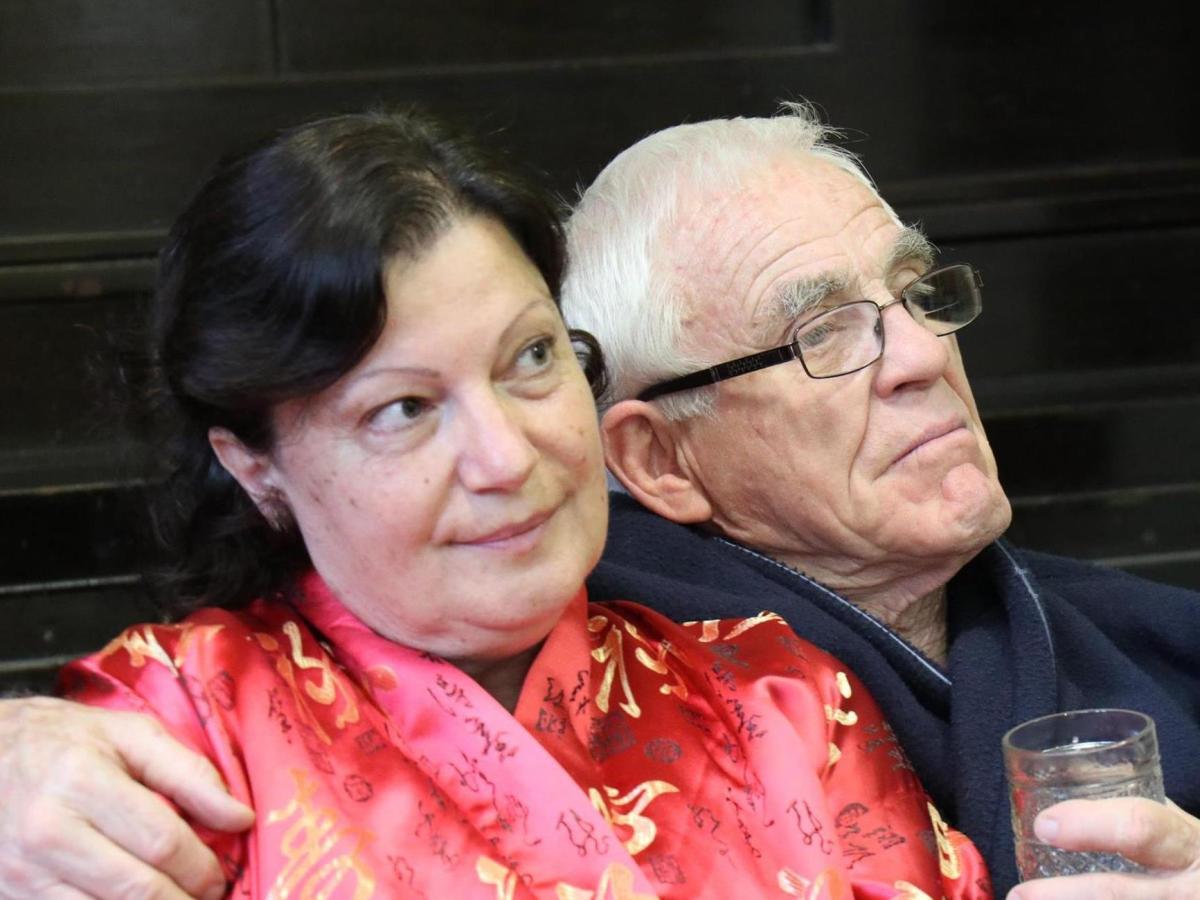Image: Michael Smythe and Maria Bardakos in Kiss Me Like You Mean It. Photo via Maitland Repertory Theatre.
A young man gyrates wildly across the stage, dancing as if no-one is watching. It’s a house party in Manchester, 1990s, the music is thumping and he’s gone out into the garden to get some air. A few moments later, a young woman strides out of the house and yells at him. The music is so loud that he cannot hear, but gradually he comprehends that he has nicked her can of beer.
It’s an unlikely beginning for a romance that may last a lifetime but – as a woman who has been married for fifty years later quips, ‘It’s not like you see them on the dancefloor and think “they’ll look good in their dentures!”’ So begins Kiss Me Like You Mean It, a play by British playwright Chris Chibnall currently on show at Maitland Repertory Theatre.
Kiss Me Like You Mean It captures the awkwardness of intimacy and the fear of rejection felt so intensely in one’s 20s. The young man, Tony, wrestles with self-consciousness as he tries desperately to strike up a conversation with Ruth, the beer’s rightful owner. Ruth is tartly defensive, bored at the party with her boyfriend of five years, and still considering the latter’s marriage proposal. Tony is immediately smitten, only later revealing to Ruth that he, too, is at the party with a partner: a girl whose party trick is to wee into a bucket, stopping the flow on demand, a trick that earns her fifty pounds from the assembled guests.
With the grit and raw humour of Manchestor in the 90s, Kiss Me Like You Mean It revels in the Bakhtinian grotesque: no body fluid is off limits, while sexual jokes and foul language abound.
As Ruth ducks back into the party to get more drinks, Tony hears the sounds of wild sex emerging from the neighbouring house. A mature woman appears in the window, engaged in a raucous strip tease, calling out to somebody within. Flabbergasted, Tony greets Ruth’s return with the news that he has seen an ‘old arse’ in the window. Shortly afterwards, Ruth glimpses an elderly man engaged in similar conduct. The counterpoint between the awkward young pair and the oversexed elderly couple is acute. It seems inevitable that these two worlds will collide, as they do when the old man – Don – emerges from his house to ask Tony to help him find a curry flavoured condom. His wife then comes out into the garden and (assisted by Ruth) begins planting some flowers. It is 3am.
What appears at first glance to be an exuberant sexual comedy gradually gives way to something darker. The old man tells Edie, his wife of 50 years, that he needs to leave by sunrise; that he won’t be there. They speak of their only child, a son far away in Australia, with deep regret.
As they drink, Edie teasingly asks her husband a series of questions designed to test his knowledge of their relationship. She asks him to tell her a secret. With all the gravitas of a spouse revealing a long-concealed affair, he announces ‘I’ve never liked your way with eggs,’ leaving his wife to splutter in defence of her cooking. ‘You never said anything,’ she wails, struck to the core. Then Edie mentions a syringe and slowly it unfurls that what we are watching is the precursor to an assisted suicide. The flowers are planted outside at 3am because no-one will be there to water them, they will die in the empty house.
Overhanging the parallel lives of the old and young couple is the spectre of economic malaise. A financial shadow hangs over the characters’ lives, as if the sun has gone out. In working class Manchester, all the old industries are gone – Don bewails the loss of his sewing machine empire – while Tony and Ruth are bright, articulate people trapped in dead end jobs. At the party, there is a sense that the heavy drinking is fuelled by boredom and frustration.
Waiting for the end of their lives, Don and Edie methodically drink the special bottles of alcohol they have accumulated over many years of marriage. A 50 year old bottle of champagne is given to the young couple, becoming – with all the romance and desperation of a message in a bottle – a symbol of hope, the passing of a precious flame to the next generation. And perhaps this is the play’s central message: despite everything, love matters, and it always will.
Playwright Chris Chibnall is currently the lead writer and executive producer of Doctor Who. His other television writing credits include Broadchurch, Law and Order UK and Life on Mars. Written in 2000, Kiss Me Like You Mean It was his first full length drama. It is not a perfect play – as other reviewers have noted, a few details are implausible (for example, Don’s ability to successfully hide the television remote control from housewife Edie) – yet it crackles with the raw humour, toughness and energy of Northern England.
3½ stars out of 5
Kiss Me Like You Mean It
The Directors:
Directed by Brendon Harris
Assistant Director: Jacob Agius
The Cast:
Zac Smith – Tony
Hope Maguire – Ruth
Maria Bardakos – Edie
Michael Smythe – Don
Season 16-24 March 2018
Maitland Repertory Theatre





